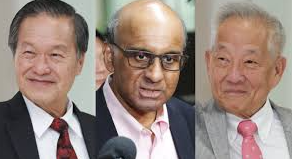As “independence” dominates campaign narratives, voters grapple with its true meaning ahead of the elections.
With just days to go before Singapore’s presidential election, the term “independent” has been repeated so often it risks losing its meaning. Each candidate—Tharman Shanmugaratnam, Ng Kok Song, and Tan Kin Lian—claims to embody independence, but their interpretations differ significantly.
The president’s role, defined as non-partisan and symbolic of national unity, has become central to debates on the candidates’ political affiliations—or lack thereof. While Ng Kok Song emphasizes true independence through his lack of political ties, Tharman highlights his “independence of mind,” and Tan positions himself as independent from the ruling party, despite significant opposition endorsements.
Competing Visions of Independence
Tan Kin Lian has framed his campaign as anti-establishment, backed by opposition figures like Tan Jee Say and Dr. Tan Cheng Bock. However, critics argue that this conflates opposition backing with true non-partisanship.
Tharman, despite his decades-long tenure with the ruling People’s Action Party (PAP), argues that independence transcends political labels. His campaign focuses on his proven track record and commitment to unity.
Meanwhile, Ng asserts that true independence requires zero political affiliations, positioning himself as the only candidate without ties to the ruling party or opposition.
Beyond Politics
While independence remains a focal point, voters are urged to consider broader qualities such as competence, character, and financial expertise. Analysts note that the role’s symbolic and financial responsibilities demand a candidate capable of uniting Singaporeans and representing the nation effectively on the global stage.
As the election approaches, the question remains: Who can best uphold the values of independence, unity, and leadership that the presidency represents?








